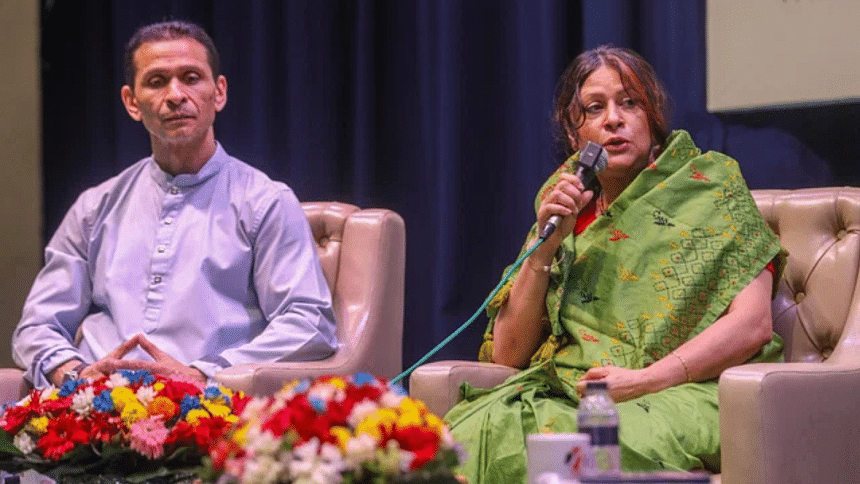‘Liberation War is not about a single family’

One family, one individual narrative of the Liberation War is the reason why the country's young people feel disconnected with it, said Sharmin Ahmad, daughter of the country's first prime minister Tajuddin Ahmad, yesterday.
"For a long time, they [youth] were taught only the history of one family, one individual. As a result, they feel disinterested. However, the Liberation War was a people's war, with contributions from every race. It is essential to highlight these contributions," she added.
She said, "Today's children are confused. They think the history of the Liberation War is the story of the Sheikh family -- about Russel, Jamal and Kamal. There's no space here for the stories of the poor mothers' children, those who lost their lives and dignity."
Sharmin urged the younger generation to revisit the history of the Liberation War.
She said this while speaking at a programme titled "Shotabdir Kanthashor Tajuddin Ahmad: Kannyar Chokhe, Putrer Chokhe", organised by Oitijjihya, a publishing house marking two decades of its journey.
During the event, Oitijjihya launched a paperback edition of "Tajuddin Ahmad: Neta o Pita", a book published in 2014 on the liberation and post-liberation period, authored by Sharmin.
During her speech, Sharmin said the Liberation War was a people's war. However, the history of the war of independence has been established on a single pillar -- the "Bangabandhu pillar".
In this process, the contributions of many people have been lost, especially the stories of the rural youth, adolescents, and Biranganas, she added.
She said, "Bangabandhu's image is on the 1-taka note, and also on the 5, 10, 20, 50, and 100-taka notes. This isn't about diminishing Bangabandhu, but it becomes the history of just one person."
Sharmin also highlighted various historical aspects of the Liberation War that took place in Bangabandhu's absence.
She said during the war, Bangabandhu fostered a secret group within the Awami League that worked covertly with the Indian RSS and intelligence agencies, which harmed the Liberation War effort significantly.
This eventually led to the formation of the Mujib Bahini, which attacked freedom fighters, she claimed.
She noted that these events are part of history, not intended to demean anyone. However, there is a fear that revealing these facts could disrupt the image that former prime minister Sheikh Hasina wishes to uphold.
"At that time, Bangabandhu, Tajuddin Ahmad, and others had planned to go underground on the night of March 25, taking shelter in Old Dhaka to declare independence and lead the war. However, that plan was foiled when Bangabandhu was arrested, which deeply shocked and surprised Tajuddin Ahmad. This incident marked the point where two distinct paths emerged in history."
Sharmin said Bangabandhu holds a significant place as a "symbol" that will always remain. Beyond that, however, his actions and legacy should be open to discussion and critique. It is important to create space for this.
Speaking at the event, Tanjim Ahmad Sohel Taj, son of Tajuddin, said, "Maintaining the same principles in both personal and public life was a defining characteristic of Tajuddin. Today, there is a lack of such values among our politicians."
"We have compromised on essential qualities like morality, honesty, principles, and ideals. This is why the country's political landscape is so chaotic. If we could uphold these values, they would be reflected in the betterment of our society."
Reflecting on the sacrifices of those who fought for Bangladesh's independence, Sohel Taj added, "Our duty is to honour the debt of their blood. Even if we can't give anything else, we should at least show respect to them."

 For all latest news, follow The Daily Star's Google News channel.
For all latest news, follow The Daily Star's Google News channel. 



Comments